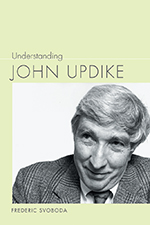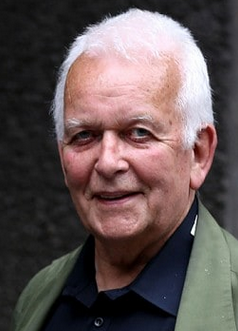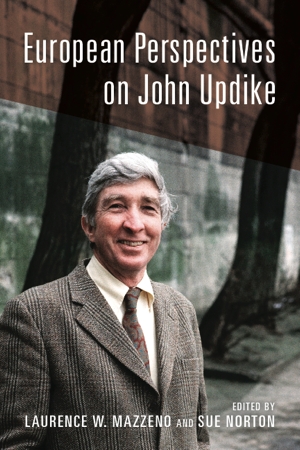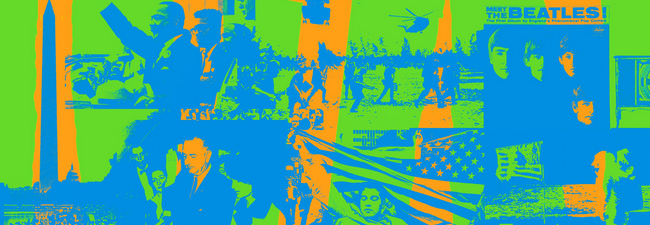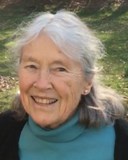 The obituary for Mary Pennington (Updike) Weatherall published by the Local Ne.ws reports that a celebration of her life will be held at First Church in Ipswich, UCC, One Meetinghouse Green, on Saturday, May 5 at 2 p.m. And there is much to celebrate. John Updike Society members know only that she was an artist and a supporter of her first husband, John Updike, who read his drafts and gave him advice, and that she continued to support him after he died by graciously backing the society by contributing to the restoration of The John Updike Childhood Home, participating in two conferences (shown in photo below at the Plowville home with scholar Don Greiner and husband Robert Weatherall), and assisting scholars with their projects.
The obituary for Mary Pennington (Updike) Weatherall published by the Local Ne.ws reports that a celebration of her life will be held at First Church in Ipswich, UCC, One Meetinghouse Green, on Saturday, May 5 at 2 p.m. And there is much to celebrate. John Updike Society members know only that she was an artist and a supporter of her first husband, John Updike, who read his drafts and gave him advice, and that she continued to support him after he died by graciously backing the society by contributing to the restoration of The John Updike Childhood Home, participating in two conferences (shown in photo below at the Plowville home with scholar Don Greiner and husband Robert Weatherall), and assisting scholars with their projects.
But there was much more to Mary, as the obituary notes:
In addition to raising her four children and continuing to paint, Mary served on Ipswich’s Fair Housing Committee, “working to ensure that all who wanted to move to, and purchase property in Ipswich, were welcome to do so. She was active in the civil rights movement and, in 1965, flew to Alabama with fellow Ipswich residents, the late Rev. Goldthwaite Sherrill, William Wasserman, and the late Sally Landis Wasserman, to participate in one of the three Selma to Montgomery marches.”
Mary was a local activist as well, working in the 1990s with second husband Robert Weatherall and “the town, the Greenbelt Association, the Nichols family of Essex, and with a substantial monetary contribution of their own, helped make it possible to purchase 10 acres of open meadow above their house. Now known as The Nichols Field, it is an invaluable addition to the open spaces of Ipswich, enjoyed by joggers, dog walkers, fishermen, and romantically inclined teenagers, who walk the mile down Labor-in-Vain Road to enjoy the field overlooking the Ipswich River.”
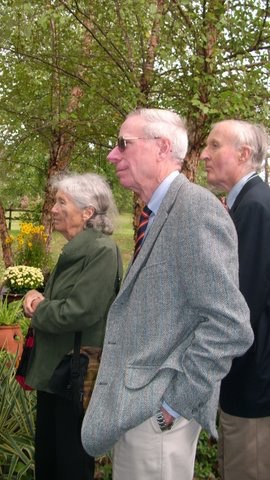 Mary’s “landscapes of Ipswich, the obituary reports, “were avidly purchased and collected, and a large retrospective of her work was held at the Schlsingler Library at Radcliffe College [her alma mater] in the year 2000.”
Mary’s “landscapes of Ipswich, the obituary reports, “were avidly purchased and collected, and a large retrospective of her work was held at the Schlsingler Library at Radcliffe College [her alma mater] in the year 2000.”
Mary, the daughter of Rev. Leslie Talbot Pennington and Elizabeth Entwistle Daniels, a teacher of Latin, was born in Braintree, Mass. on Jan. 26, 1930, and “raised in Cambridge and Chicago,” according to the obituary. “She married John Hoyer Updike on June 26, 1953, and they spent their honeymoon in a small cottage behind the Goodale Apple Orchard on Argilla Road, loaned to them by a family friend.” After living in New York City they moved to Ipswich in 1957 and spent nearly two decades on the North Shore together. Their marriage, which was famously chronicled in The Maples Stories, ended with a “no-fault” divorce in March 1976.
According to the obituary, weeks after celebrating her 88th birthday Mary “caught a bad cold, which in turn led to pneumonia. When they learned of her illness, all seven of her grandsons and a wife, Anoff and Jaime Cobblah, Kwame Cobblah, Wesley Updike, Trevor Updike, Sawyer Updike, Kai Freyleue, and Seneca Freyleue, arrived from various corners of New England to be with her. Her great grandson, Weston Scott Kofi Cobblah, was also there with his parents.
“She is survived by her four children, Elizabeth Cobblah, David Updike, Michael Updike, and Miranda Updike; their spouses, Tete Cobblah, Wambui Githiora Updike, Jeffrey Kern; her three step-children, Robert, Alexander, and Helen Weatherall and their spouses.”
Condolences may be sent by visiting www.whittier-porter.com. In lieu of flowers, contributions in her memory may be made to the Ipswich Refugee Program, P.O. Box 285, Ipswich, MA 01938-9998.
“Mary Pennington Updike Weatherall, 88, an artist and first wife of John Updike” (Boston Globe)
 Lehigh University Press will re-release John Updike’s Pennsylvania Interviews, edited by James Plath, in paperback on March 15, 2018. That’s good news for individuals who didn’t want to put out $105.00 for the hardcover version that was published in 2016. The paperback price at Amazon.com is $49.99.
Lehigh University Press will re-release John Updike’s Pennsylvania Interviews, edited by James Plath, in paperback on March 15, 2018. That’s good news for individuals who didn’t want to put out $105.00 for the hardcover version that was published in 2016. The paperback price at Amazon.com is $49.99.



